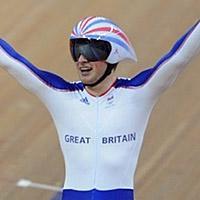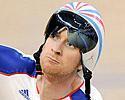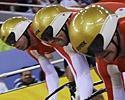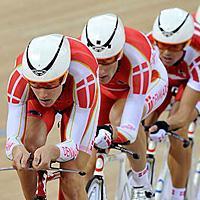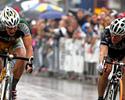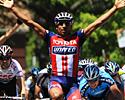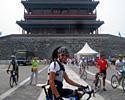First Edition Cycling News, August 16, 2008Edited by Laura Weislo British rise to the challenge in opening sessionBy Rob Jones in Beijing
The track portion of the Olympic program opened on Friday at the Laoshan velodrome in the west end of Beijing. Great Britain followed up their stellar showing at the World Championships by winning the first medal competition on the track - the team sprint. France, who was hoping for revenge after taking bronze in Athens, had to settle for silver, while Germany took the bronze ahead of Australia. In addition to the Team Sprint, the qualifying rounds of the men's and women's individual pursuit were held. Great Britain was clearly remembering having been shut out of the medals in the Team Sprint at the 2004 Games and losing the world title on their home track in March. They smashed the existing best time for the event in the qualifying round, with a time of 42.950 seconds, the first ever under 43 seconds. All three riders - Jamie Staff, Jason Kenny and anchor Chris Hoy set new world times for their legs. (Note: there is no world record, since the event can take place on tracks of different lengths) The top eight teams - Great Britain, France, Germany, Netherlands, Australia, Japan, Malaysia and the United States - moved on to the next round. The United States actually had the ninth fastest time, but after Poland was relegated for handing off between riders outside the designated zone, the Americans bumped into the final spot. In the next round, It was again Great Britain and France head and shoulders above the rest to qualify for the gold medal final, while Germany and Australia would go for bronze. The Brits were clearly riding at another level, as they trounced the French squad of Grégory Baugé, Kévin Sireau and Arnaud Tournant by over half a second. "To beat them by half a second, made it just that bit more exciting," commented Hoy. "Honestly, it took every inch of effort in beating the French, who have been invincible in this event. Today, we really put all the pieces of the jigsaw together. To win as part of a team is totally different from the individual medal [in the Kilo, which he won in Athens]." Tournant was philosophical about losing the title. "For me, it's my last time at the Olympics, except for tomorrow [in the Keirin], so it is a big moment and a big pleasure to be here. It was a good race, and it was so fast. It was a great time for our team, but they are fast boys, the British team." Germany, after a slow start which saw them behind the Australians for the first two laps, clawed their way back into the medals by eight thousandths of a second with a superb last lap by Stefan Nimke. Wiggins best in class
Wiggins was clearly the class of the field, starting in the final heat against Alexei Markov of Russia. Up until the last two heats, no one had manage to cra ck the 4:20 barrier, however, Hayden Roulston (New Zealand) served notice that he has brought good form to the Games with a strong ride of 4:18.990 . But Wiggins was up next, and after a slightly slow start - second fastest behind Volodymyr Dyudya (Ukraine) - he moved into the lead after the halfway mark and continued to pull away from everyone else. His time of 4:15.031 was 0.134 seconds ahead of the previous mark, which he set in Athens, and is starting to make Chris Boardman's 1996 world record of 4:11.114 look attainable. Roulston may be the biggest threat to Wiggins, but he is pragmatic about his chances. "I think anyone is beatable, but you have to cut your head off to beat Bradley..." Worthy of mention was American Taylor Phinney's seventh plac, moving him on to the next round. The only Junior-aged rider on the track, Phinney is looking for experience at these Games. "My goal was just to qualify. That was the hardest that I have ever pushed myself in a Pursuit. Today I went out a little hot. Watching Wiggins breaking the Olympic record on this track was incredible and inspiring." Women add to British dominationThe women's Pursuit saw a 1-2 finish by the Brits in qualifying, but it wasn't world champion Rebecca Romero in first, but her team-mate Wendy Houvenaghel, by two-tenths of a second. Houvenaghel had gone up against American Sarah Hammer in the second to last heat, which might have inspired her to dig deeper. Hammer, on the other hand, had a relatively poor ride, qualifying fifth fastest. "It was ugly for me personally," Hammer said of her qualifying heat. "That's not how I hope to feel. My body wasn't handling it today. Four laps in I was like, 'oh, this is not going to be fun.' It was just a bad day. I was a little nervous, so I'm lucky the races are over three rounds and three days." On Saturday, the pace of racing picks up, with three medal finals in the Men's Points Race, the final of the men's Individual Pursuit, and the men's Keirin. Germany gets its medal
The German national cycling team has saved its streak of a medal at every Olympics since 1896 except for one (Los Angeles 1932), and this year it was the track team which did the honours. Rene Enders, Maximilian Levy and Stefan Nimke won bronze in the men's team sprint. "Bronze was our goal and now we really have it," said Nimke, who won gold in the event in Athens 2000. "Now the burden is off our shoulders." The 21-year old Enders got off to a shaky start in the final round against Australia, putting the Germans behind, but a strong effort from Levy turned the tables on the opposing Australian team, and Nimke, 30, accelerated during his final round to take the win by only eight-one thousandths of a second. (SW) Danish track turnaround
Denmark heads into the Olympic Games track events in Beijing, China this weekend as a gold medal contender for the first time in decades. Cyclingnews' Paul Verkuylen spoke to national coach Heiko Salzwedel about the team's remarkable turn around. Four years ago Denmark didn't even qualify for the team's pursuit at the Olympic Games in Athens, Greece, nor did it take part in the UCI World Track Championship. This weekend, however, Demark is one of the favourites to take the Olympic team pursuit title at the Laoshan Velodrome in Beijing. It's secret? World renowned coach Heiko Salzwedel, the German who has performed similar miracles for the Australian and British programmes in the past. Back in 2004, Denmark was turning in team pursuit times around the 4.12.00 seconds, way off the pace of any championship. This year it finished second in the UCI Track World Championships behind host nation Great Britain in 3.59.40, after qualifying fastest in 3.57.73. A program developed by Salzwedel was the catalyst for the nation's vast improvements. "I asked for only a few things before I took the job as the Danish coach," Salzwedel said. "I wanted funding to go to all the World Cups, and approval to have training camps whenever I needed them. Also I wanted to incorporate an altitude program." Salzwedel took a position with the Danish federation in 2005 after a difficult stint with the British squad. His goal was to drag the nation out of the doldrums and into a world class squad capable of rivalling the more powerful nations like Great Britain and Australia. Salzwedel is no stranger to such a task. He was placed in a similar situation in the 1990s when he took the role as head road coach for Australia's track team. Salzwedel believes that a family atmosphere is vital in order for a team to improve and be competitive. "It is very important to keep the same group together," he said. "You need to find a good balance, not to spend too much time together so you don't get on each others' nerves. "At this stage, the Olympic spirit binds them together," he added. "It is more than just having a working relationship with these boys. It is like a family and I think that that is essential." Devolder takes Belgian titleQuick Step's Stijn Devolder has recaptured the Belgian national championship, but this time he will wear the colours of his country's flag in future time trial events. The 2007 road race champion bested last year's winner Leif Hoste (Silence-Lotto) by one minute and two seconds in the 45 kilometre event. Former U23 world champion Dominique Cornu, also of Silence Lotto, took third a further six seconds back. Hoste was in the lead at the half-way point, but blamed a lack of fitness with conceding nearly a minute and a half over the second circuit. "I felt myself weaking," Hoste said to HLN.be. "When I started the second lap, I saw Philippe Gilbert 150 metres in front of me, and I never caught him, not even on the long, straight false flat. Then you know you can't win." Devolder was pleased with his performance, saying he took the first lap more relaxed before pouring on the gas on the second. The title helped make up for his disappointing Tour de France, where he went in as a contender for the overall and ended up dropping out mid-way through the race. "The Tour was one of the biggest disappointements of my career," Devolder said. "The whole time during the Tour I was not well, but I could not give up." He dropped out of the Tour, and went home to recuperate and refocus his goals. "It allowed me to dedicate time to other goals," he said, "the national time trial was one of them. Now I have the Eneco Tour and Tour of Poland to get ready for the World Championships." Speed and skiil at US profesional crit nationalsBy Mark Zalewski, North American Editor
There are more than a few signals that summer is winding down in the US -- back to school sales, the Labor Day holiday, two-a-day football practices... but for cyclists racing in a suburb of Chicago knows as Downers Grove is a fair sign the summer crit season is coming to a close. Some dream of a stars and stripes jersey (stars and bars according to some unwitting announcers) while lower category racers look to make a name for themselves or simply experience racing on the same figure-8 course. Triumph and tragedy combine here every August, specifically in the infamous turn 8 – a place where races, as well as careers, are often defined. For 2008 one of the stories is the size of the pro men's field, which on the pre-registration lists is slightly smaller than usual at just over 60. Much of this can be attributed to the Tour of Utah happening at the same time, with the climbing specialists happy not to be fighting for wheels over 100 laps. What this has done is smlightly boiled down the field to the fast and (for lack of a better term) furious. Former winners on the start sheet include Tony Cruz (BMC), Rahsaan Bahati and Kayle Leogrande (Rock Racing) as amateurs, Brad Huff (Jelly Belly), who won both as an amateur and pro, and defending pro champ Kirk O'Bee (Health Net-Maxxis) But noticeably off the list is the entire Toyota-United team, except for Aussie Hilton Clarke who eats criteriums for breakfast and is having a fast crit season. No Ivan Dominguez or former winner Henk Vogels on the start. As well, some teams are undermanned, including O'Bee's Health Net team with only three other riders, including Karl Menzies who is coming off a serious injury. Toyota team still searching for title sponsor
The team which has been known as the Toyota-United Pro squad for the past three years is still seeking a replacement sponsor for the automobile company, which announced it would not continue its support back in May. Team manager Sean Tucker informed his riders, staff and management Friday that, although there were ongoing discussions with two potential title sponsors, the team would not be able to have a contract signed within the UCI team license registration deadline for Pro Continental status in order to keep this specific group of riders together for the 2009 season. In effect, this means that the team as it has been known for three years in name, and the current composition of riders, staff and management will cease to exist as of December 31, 2008. "Although, most of our riders are under contract until December 31, 2008 and we are not obligated to release them prior to this date, we have decided that ... we do not want to put the riders in a position of not being able to obtain employment in the event our sponsorship contract is not ultimately signed," said Tucker. He does think the team will secure a sponsor in time to gain a UCI Continental team license by November, but did not want to put riders in a "bad spot". "It's truly a pity that we were not able to get a contract signed in time to keep our family together going forward, even though we have a couple of sponsors who can potentially sign in the coming months," continued Tucker. "Today I was forced to tell my riders that although I have money burning a hole in my pocket to support the team and we have contractual commitments from many of our current sponsors for 2009, we cannot give them a job because they are either too old, or we don't have enough time to sign our new sponsor by the imposed UCI deadline to become either a Continental or Pro Continental team in 2009," continued Tucker. Toyota-United was the winningest team in the United States, racking up 155 victories over the its three seasons. This year alone, the squad took 59 wins and 132 podiums. "If our team continues, we will certainly have some significant changes due to the new UCI rules. We are looking forward to securing a new partner for the 2009 season by the end of November who can benefit from and build their brand by being associated with our world class organization. Glen Chadwick's Olympic experienceCyclingnews diarist Glen Chadwick wraps up his take on the Olympic experience this week. Today, he recalls the big day - race day! In tomorrow's diary, Chadwick takes in some sights and then hits the road back to the USA. For all of Chadwick's Olympic diaries go here. It is time for CRAC and the super squad
Well the day was finally upon us. Went to bed early the night before to get a good sleep, but woke up at 4:30 and rolled around till it was time to get up at 7:30. I guess my mind started to wander and think about the race and other things. From that point on I was gonna be hurting trying to sleep well again. But once I was up, got a good breakfast and a good coffee I was ready to get into it. It was as clearer day as we were ever gonna get in China and I think and the temp didn't seem so bad either. All the teams piled into a heap of buses and were all taxied over to the start in downtown Beijing, which was a stones throw from Tiananmen Square. When we arrived at the start it was a pretty quiet atmosphere. I don't think it was an easy venue to cruise to and have a look? Even the sign-on was just at a little table down the end of the starting straight. (The kind of sign-on you'd see at an NRC event) The three of us had cooling vests on before the start; the idea of these is to keep your core temperature down. They work really well. They kept the engine nice and cool for a little while. All the countries were called up one by one in front of the spectators lucky enough to get tickets to start. These were all basically locals or CRAC (Chinese Rent A Crowd). For a lot of events the ticket prices were so low (e.g. BMX at $11) the locals just scooped them all up before anyone else had a chance. Normally, the road race is one of the only Olympic events that you can watch for free, well that was the case in the first 80 kilometres while we raced out to the circuit. However, once we were out there you couldn't get onto the circuit as they had it completely closed off to everyone. There were two massive grandstands on either side of the finish straight, which were loaded with CRAC. So the first 80 kilometres were pretty cruisey, but once we hit the circuits... Man, oh man! The problem was that there was a significant break that formed about 20 kilometres to the circuit and the bigger squads USA and Russia missed the move, so the chase was on. To give you a rough idea of the circuit I'll basically say it was a 12-kilometre climb – tailwind – which isn't good. Then followed by a 12-kilometre decent, which was a head wind and you had to pedal down. Every lap was a fast one. Continue to the rest of the diary. (All rights reserved/Copyright Future Publishing (Overseas) Limited 2008) |

|
January 2009 |
Recently on Cyclingnews.com |

